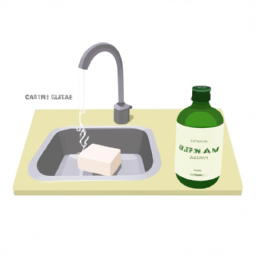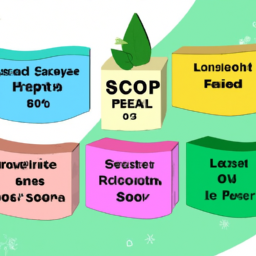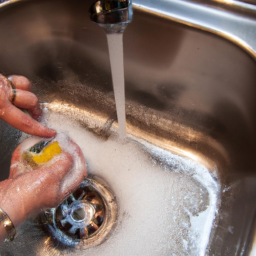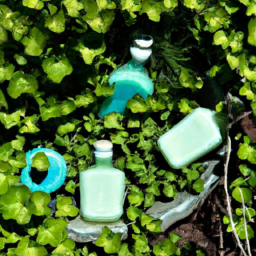I’m excited to share how I’ve found a way to go green in the kitchen with biodegradable dish soap. It’s a simple change that can have a big impact on the environment.
In this article, I’ll discuss the benefits of using biodegradable dish soap, offer tips for choosing the right eco-friendly option, and provide alternatives to traditional dish soap.
Let’s make a difference together and keep our kitchen clean while being mindful of our planet.
Benefits of Biodegradable Dish Soap

I love using biodegradable dish soap because it has numerous benefits for both the environment and my health. Sustainable cleaning is an essential aspect of living an eco-conscious lifestyle, and biodegradable dish soap allows me to do just that.
Firstly, it helps to reduce water pollution. Traditional dish soaps often contain harmful chemicals that can end up in our water systems, harming aquatic life. Biodegradable dish soap, on the other hand, is made from natural ingredients that break down easily in the environment, minimizing the impact on water quality.
Additionally, biodegradable dish soap is gentle on my skin and respiratory system. Many conventional dish soaps contain harsh chemicals that can cause skin irritation and allergies. By using a biodegradable option, I can avoid these potential health risks and enjoy a safer and more pleasant dishwashing experience.
Furthermore, biodegradable dish soap promotes sustainable practices. The production of these soaps often involves using renewable resources and adopting eco-friendly manufacturing processes. By choosing biodegradable options, I’m supporting companies that prioritize sustainability and contribute to the overall well-being of our planet.
How to Choose the Right Eco-Friendly Dish Soap

When selecting an eco-friendly dish soap, it’s important to consider a few key factors. One of the first things to look for is eco-friendly packaging. Opt for dish soaps that come in recyclable containers or those made from post-consumer recycled materials. This helps reduce waste and minimizes the impact on the environment.
Additionally, it’s crucial to choose a dish soap that contains natural ingredients. Look for products that are free from harsh chemicals, synthetic fragrances, and dyes. Instead, opt for dish soaps that use plant-based ingredients and essential oils to effectively clean your dishes. Not only are these ingredients safer for the environment, but they’re also gentler on your skin.
Another important consideration is the biodegradability of the dish soap. Ensure that the product is biodegradable, meaning it can break down naturally without leaving harmful residues in the environment.
Tips for Using Biodegradable Dish Soap Effectively

To maximize the effectiveness of biodegradable dish soap, proper usage is key. When using biodegradable dish soap for cleaning dishes, it’s important to follow a few tips to ensure optimal results.
First, make sure to properly dilute the dish soap according to the instructions on the packaging. Using too much soap can lead to excessive suds, making it harder to rinse off the dishes and wasting the product.
Secondly, pre-soaking heavily soiled dishes can help to loosen tough stains and make them easier to clean. This can be done by filling the sink with warm water and a small amount of dish soap, allowing the dishes to soak for a few minutes before washing.
Additionally, using a dish brush or sponge with a good grip can help to effectively scrub away food particles and grease.
Lastly, be sure to rinse the dishes thoroughly with clean water to remove any soap residue.
Proper usage of eco-friendly dish soap not only ensures clean and spotless dishes, but also contributes to a greener and more sustainable kitchen routine.
Eco-Friendly Alternatives to Traditional Dish Soap

One popular and effective eco-friendly alternative to traditional dish soap is using a small amount of vinegar mixed with water. This mixture not only cuts through grease and grime but also has antibacterial properties, making it a great option for sustainable dishwashing.
Here are five other eco-friendly alternatives to traditional dish soap that are both effective and gentle on the environment:
Castile soap: Made from natural ingredients like olive oil, castile soap is a versatile and biodegradable option for cleaning dishes. It comes in liquid form and can be diluted with water for use.
Baking soda: Known for its cleaning properties, baking soda can be used as a gentle abrasive to scrub dishes. It also helps to absorb odors and can be combined with other natural cleaning products like vinegar for added cleaning power.
Lemon juice: The acidity of lemon juice makes it an effective natural cleaner. It can be used to remove stains and grease from dishes and leaves a fresh citrus scent behind.
Soap nuts: These natural, dried berries contain saponins, a natural surfactant that creates suds when in contact with water. Soap nuts can be boiled to create a liquid soap alternative for dishwashing.
DIY dish soap: By combining ingredients like liquid castile soap, essential oils, and water, you can create your own eco-friendly dish soap that’s free from harsh chemicals.
The Impact of Biodegradable Dish Soap on the Environment

As I continue the discussion on eco-friendly alternatives to traditional dish soap, it’s important to address the impact of using biodegradable dish soap on the environment.
Biodegradable dish soap is a much better choice for the environment compared to regular dish soap. Regular dish soap contains chemicals and ingredients that are harmful to the environment, such as phosphates and synthetic fragrances. These chemicals can pollute our waterways and harm aquatic life.
On the other hand, biodegradable dish soap is made from natural and plant-based ingredients that are safe for the environment. It’s free from harmful chemicals and toxins, making it a more sustainable option. Using biodegradable dish soap helps reduce our carbon footprint and minimize our impact on the planet.
It’s also important to note the significance of using eco-friendly cleaning products in general. By opting for biodegradable dish soap and other eco-friendly cleaning products, we can contribute to creating a healthier and cleaner environment for ourselves and future generations.
Frequently Asked Questions
How Does Biodegradable Dish Soap Compare to Regular Dish Soap in Terms of Effectiveness?
Biodegradable dish soap and regular dish soap have different effectiveness levels. But, when it comes to comparing them, I find that biodegradable dish soap is just as effective as regular dish soap. Additionally, it has a lower environmental impact.
Are There Any Specific Ingredients to Look Out for When Choosing Biodegradable Dish Soap?
When choosing biodegradable dish soap, it’s important to look for ingredients that are natural and plant-based. Avoid chemicals like sulfates and phosphates, as they can harm the environment and water sources.
Can Biodegradable Dish Soap Be Used for Other Cleaning Purposes Besides Dishes?
Using biodegradable dish soap for cleaning purposes other than dishes is eco-friendly, but is it as effective as regular dish soap? And are there any specific ingredients to avoid when choosing biodegradable dish soap?
Are There Any Precautions or Special Instructions to Follow When Using Biodegradable Dish Soap?
There are some precautions and special instructions to follow when using biodegradable dish soap. It’s important to read the label for specific guidelines and avoid using it on certain surfaces or with certain materials.
How Long Does It Take for Biodegradable Dish Soap to Break Down in the Environment?
I’m not sure about the exact timeline, but biodegradable dish soap is designed to break down in the environment faster than traditional dish soaps. This helps reduce the environmental impact.
Conclusion
In conclusion, making the switch to biodegradable dish soap is a simple yet impactful way to go green in the kitchen.
By choosing eco-friendly options and using them effectively, we can minimize our environmental footprint and protect our planet.
With a wide range of alternatives available, it’s easier than ever to make sustainable choices and contribute to a healthier, more sustainable future.